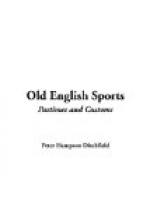without breaking his lance, he runneth strongly against
the shield, down he falleth into the water, for the
boat is violently tossed with the tide; but on each
side of the shield ride two boats furnished with young
men, which recover him that falleth as soon as they
may. Upon the bridge, wharves, and houses by
the river-side, stand great numbers to see and laugh
thereat.” Stow thus describes the water
tournament—“I have seen also in the
summer season, upon the river Thames, some rowed in
wherries, with staves in their hands, flat at the fore-end,
running one against the other; and for the most part,
one or both of them were overthrown and well ducked.”
This sport on the water was a variety of the famous
quintain, which was itself derived from the jousts
or tournaments, only, instead of a human adversary,
the knight or squire, riding on a horse, charged a
shield or wooden figure attached to a piece of wood,
which easily turned round upon the top of a post.
At the other end of the wood was a heavy bag of sand,
which, when the rider struck the shield with his lance,
swung round and struck him with great force on the
back if he did not ride fast and so escape his ponderous
foe. There were other forms of this sport, which
is so ancient that its origin has been lost in antiquity.
Queen Elizabeth was very much amused at Kenilworth
Castle by the hard knocks which the inexpert riders
received from the rotating sand-bag when they charged
“a comely quintane” in her royal presence
in the year 1575.
A handsome quintain still stands on Offham village
green, in Kent, although it is no longer used for
the skilful practice of former days. It is the
custom to hoist married men, who are not blest with
children, on the quintain, which is made to revolve
rapidly. Sometimes discontented and disobedient
wives share the same fate.
Chester was famous for its Easter sports, when the
mayor with his mace, the corporation with twenty guilds,
marched to the Rood-eye, to play at football.
But “inasmuch as great strife did arise among
the young persons of the same city” on account
of the game, a change was made in the reign of Henry
VIII., and foot-races and horse-races were substituted
for the time-honoured football, and an arrow of silver
was given to the best archer.
But Easter sports are almost finished: however,
we have not long to wait for another popular anniversary;
for the famous Hock-tide sports always took place
a fortnight after Easter, and much amusement, and
profit also, were derived from the quaint observances
of Hock Monday and Tuesday. The meaning of the
word and the origin of the custom have been the subjects
of much conjecture; but the festival is supposed to
be held in remembrance of the victory of our Saxon
forefathers over the Danes in the time of Ethelred.
The custom was that on Hock Monday the men should
go out into the streets and roads with cords, and
stop and bind all the women they met, releasing them
on payment of a small ransom. On the following




